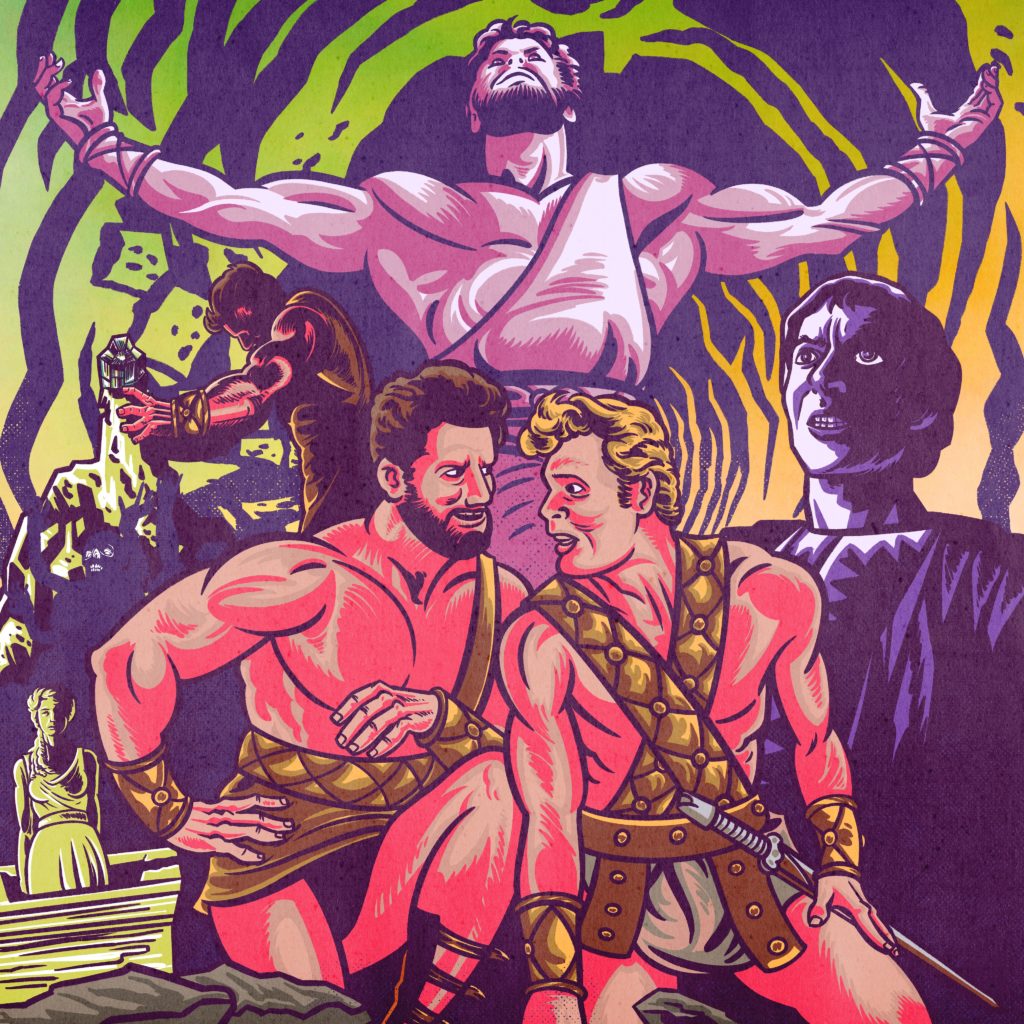“With the boys forget the girls / Boys with boys, girls get with the girls and / The boys with the boys / It’s only right and natural”
— The Frogs
It is amusing that Hercules and Theseus dedicate their every waking hour to quests to save the women in their lives: the meaning of the odyssey is so clearly contradicted by their glaring “bitches ain’t shit” attitudes. While the contemporary social media hobbyist most likely would revel in the queer-coding of these heroics, that would be unfortunately dismissive of their boyish charm. What are heroes if not pure youth simply wanting to wrestle shirtless in the mud?
Mario Bava’s take on mythology in Hercules in the Haunted World (1961) was criticized as being just another trashy Italian film when it first came out. Nowadays Bava’s lavish, color-soaked look is worshipped for the dreamlike quality it evokes. Either way, that Italian sensibility is important to the film, as it presents a very different way of seeing the stereotype of extremist Italian gender roles in cinema. The typical giallo “all men are violent bastards and all women are helpless bitches” transforms into “all boys fantasize about being a man and all girls fantasize about being a woman.” The boys want to roughhouse with each other while dreaming of loves that they’ll never quite obtain. The girls want to bask in the poetic beauty of love in the distance, without tarnishing that fountain of youth by actually complicating anything. Boyish roughhousing adventures can take them anywhere, even into Hades itself. For the girls, life is a poem and the world is a palace as long as the boys don’t show up to knock all the furniture over. The fortress of unrequited desire allows the girls to live eternal in a never-waking dream. By armoring themselves in this pureness of boyhood, boys can never die. Theseus falls into lava and comes out unscathed. In boyhood, they are immortal.
The true threat the hero boys Hercules and Theseus face, which does not lie in any sort of physical challenge, is hinted at by the introduction of Telemachus. He is perpetually in harm’s way due to his one fatal flaw: his engagement for marriage to a woman. Transcending the mere fantasy of love, he has crossed the line of turning love into a tangible reality and has thus left himself defenseless. The obvious hypocrisy of this, that Hercules also spends the entire film engaged to Deianira, is ultimately addressed as the narrative’s climactic challenge–a challenge that has nothing to do with violence (to which boy heroes are immune). It is a challenge in words and ideas as Hercules and Theseus discuss when it is okay to put a girl first and when it is not. The resolution comes in a form of returning Hercules and Theseus to the same truth they began with: one may dream of love, even make the promise of engagement, as long as they stay so busy questing that the bulk of their lives are spent as shirtless boys playing with each other in the mud. Telemachus is hardly an adventurer. His engagement is where he wants to center his life rather than what he wants to perpetually circumnavigate around.
At one point, while traversing Hades, Hercules and Theseus perform a synchronized side-stroke swim through a lake of fire (which, of course, cannot hurt them). This is the perfect image of the heroic boyhood at the center of the film. Here are the heroes with their bodies in beautiful harmony. Near nude, but not touching. Movements so graceful with each other that they have become one–a sort of desexualized loss-of-self-via-coitus. All the while amidst impossible odds that don’t even phase them.
The villain of Hercules in the Haunted World doesn’t get much screen time and is a bit of a red herring for the true conflict of the narrative, which is between the heroes. This villain, King Lico, is literally a vampire that needs to drink the blood of a woman in order to become immortal. The blood drinking twist is only revealed towards the end of the film after it has been established that immortality also comes from staying prepubescent. King Lico and Telemachus are the only true adults in the story. Telemachus is forever helpless because his relationship to women is under their feet. King Lico can only become strong by doing the opposite, by taking the life essence away from women. In either case, there is no road towards equality between men and women presented. In contrast, the goofy dance of love that the boy heroes display has a peculiar sort of equality to it; a queer-segregationist one, but still one where everyone gets to be on the dancefloor at least. In the end that is where everything returns to as well. Not an evolved state, but just the one where things began: complicated, filled with contradictions, but with everyone at least able to be happy again for the moment in the fantasy of what could be between men and women–just as long as no one tries too hard to stop being boys and girls.
For a director better known for his giallos, Bava hints here at a psychological way of understanding the true source of dilemma in high-melodrama, violent Italian storytelling. It is a simple understanding as well: people want to remain kids, and becoming an adult is an act of violence in itself. ★
Eager for more Weird Boners? Check out this piece on Brian De Palma’s sleazy voyeuristic classic, Body Double!


